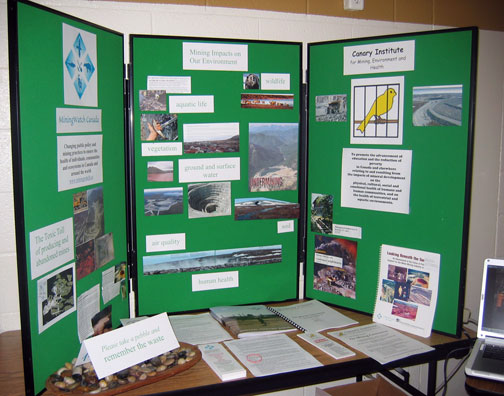
MiningWatch Canada and the Canary Research Institute of Mining, Environment and Health displayed information and presented two workshops at the ‘Embracing the Change’ symposium in Kemptville, Ontario on May 17, 2006. Over 350 student and teacher delegates participated in a full day conference hosted by Upper Canada District School Board. The focus was the environment and the purpose was to motivate youth and teachers to be part of bringing about change. The conference encouraged student participation in voluntarism, environmentalism and global causes to improve life for us all. Students and teachers could attend their choice of 17 workshops on how to get involved in issues, find a cause to help their fellow wo/man, and do whatever it takes to see it through.
Ryan Hreljac, the keynote speaker, urged students to take action to change the world into the place they want it to be. His message was that everyone, no matter how old, young, tall, or small, can make a difference. Hreljac started ten years ago when he was in grade one. He wanted to raise $70 to fund construction of a well for an African village after hearing a story about people who didn’t have clean drinking water. His initial success in raising those funds eventually led to him establishing Ryan’s Well in 2001. The foundation has grown into an international organization that has raised $1.5 million so far and created well and sanitation projects that provide clean water for about 350,000 people in Africa and South America.
For most participants who visited the MiningWatch Canada and Canary Research Institute display booth or attended the workshops, it was their first time to learn about the work of these organizations and the impacts of mining on the environment. Visitors to the display viewed a short film, picked up printed material and took home a pebble to remember the waste generated by mining activities. The workshops were presented by Marilyn Crawford, a retired teacher who became involved in environmental issues and advocacy in 2001 when a mining claim was staked on the land where she lives with her husband. Hearing about the issues first hand and what needs to change lead many people to confirm their commitment to bring about awareness and change.
A workshop for students and teachers set out indicators for recognizing what issues to become involved in, where to begin and how to motivate others to become involved in environmental advocacy. Strategies for identifying what has to change and examples of what others have done to bring about change were included. A simulation activity illustrated the cumulative effect that our increasing need for mineral extraction has on the environment.
A separate workshop encouraged teachers to bring examples of environmental issues and concerns into the classroom in order to foster understanding and involvement of students. Small group discussions identified challenges to making large environmental issues ‘real’ and enabling students to identify with the issues. The workshop included an overview of “The Mining Controversy”, an ‘Awareness and Education Kit’ for Ontario Grade 7, published by the Canary Research Institute, that investigates mining as it relates to aspects of the economy, the environment, and communities. Prepared by Beth Nicol and Marilyn Crawford, the cross-curricular programme relates to Reading, Geography, and Science, and contains everything needed to deliver an effective, skill-based unit. It leads students to consider the impact and benefits of resource extraction, to develop their own point of view and to gain skills in organizing materials and thoughts to debate a controversial issue. The Mining Controversy is available on the Canary Institute web site as a PDF file.